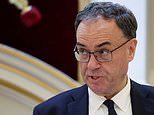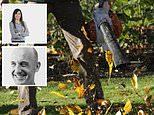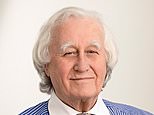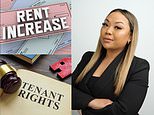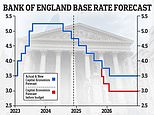We're twins and if one of us dies the other gets a £150k inheritance tax bill
So alike were James Cooper and his twin Paul that when they first started primary school their teachers made them wear name badges. 'We'd get up to all sorts of mischief,' says James who is the elder by minutes, 'and swap our jumpers to confuse them.'
Their identical likeness has been matched throughout their lives by their closeness, felt all the more keenly because the brothers were adopted as six month-old babies.
'We've always known we were adopted,' says James, a business co-ordinator for pharmaceutical giant GSK, 'and we very close to our parents too,' he adds, describing their happy childhood in Hertfordshire.
Growing up, they found their own identities and independence, but even after they'd left home they spoke every day, each buying a three-bedroom house, close to their parents.
After their parents Elaine and Roger Cooper died in 2009 and 2010, James and Paul, who are both single, decided to buy a house together.
'Our parents had left us a bit of money and we sat at my kitchen table and decided to pool our resources, otherwise we were paying double the bills on everything from utilities and council tax to broadband.' That was 11 years ago.

Penalised: James, right, or his twin Paul Cooper, here aged nine, will face a £150,000 inheritance tax bill when one of them dies
Today, James and Paul, 57, can be found in the pretty village of Braughing, Hertfordshire, enjoying a glass of wine in The Brown Bear or playing darts.
The place they call home is a four-bedroom, Grade II-listed house where they're still sorting out the furniture from their parents' house and their former separate homes.
As they head towards retirement, their future feels more uncertain.
'We just have each other,' says James bleakly. It's not without reason. For their attempts to pool resources to protect their futures will prove fruitless as a result of current legislation when one of the twins dies.
The remaining brother will be handed a £150,000 tax bill on their home, thanks to an unfair rule that means long-term cohabiting siblings do not benefit from the inheritance tax (IHT) break afforded to spouses.
James says he and Paul, an IT consultant, have left everything to each other in their wills. In the event of the second twin's death, they will pass on their assets to their cousin's children. IHT rules mean assets over £325,000 are taxed at 40 per cent, while anything within that allowance can be passed on tax-free.
Married couples and civil partners can inherit from each other free of inheritance tax. That means that when a partner dies, the surviving one does not face a tax bill on their shared home and savings.
But siblings who live together in old age are not afforded the same protection and are treated like everyone else, meaning their whole estate is potentially liable to IHT. Like long-term cohabitees, if a sibling dies, they face a hefty bill and if they don't have the funds to pay it, they will be forced to sell the home to cover costs.
The surviving Cooper twin will have to pay £150,000 inheritance tax on the home which they bought for £900,000 in 2013 but is now worth £1.4 million.
On the second death, the beneficiaries will have to pay a £470,000 bill, assuming a £100,000 rise in house prices, because the twins are joint tenants.
The Coopers only qualify for the nil rate band, which is £325,000, rather than the residence nil rate band, which is £175,000 and applied to estates passed on to direct descendants. This is because neither twin is a widower or has children. James says: 'Inheritance tax has always been in the back of our minds. Now the Government seems to want to take, take, take.
'We've paid into the system all of our lives. We've both had jobs since we were 16 and paid taxes. We've never claimed unemployment benefits. We're a bit more comfortable now the mortgage has been paid off but they're taking more and more money. Then we have to worry that if one of us goes we'll have to sell the house.'
The twins could also be stung by any gifts they give to each other that go above the annual £3,000 gifting allowance. Any gifts made above that will be potentially exempt transfers (PETs) which are exempt if the individual survives for seven years.
The number of siblings liable to pay inheritance tax is small, given they make up a tiny proportion of the 4 per cent of families currently likely to pay it.
However, now that pensions will fall under the levy the figure is set to rise to 8 per cent and cohabiting siblings will be among them.
This could increase further as higher house prices push more people into less traditional home-sharing setups, including living with siblings or friends.
Rachael Griffin, financial planner at Quilter, says: 'That's why the residence nil rate band is so outdated. The whole point of it, when introduced, was to stop people selling their house when one person dies.
'Unfortunately, that only works if you're spouses or have direct descendants. People without children don't get that benefit.'
James is angry and worried about what IHT could mean for him and Paul, particularly as they approach retirement. 'The Government are taking everything off you at the moment,' he says.
'They're taking away the winter fuel allowance before we've got it and they're taking more money off you for your pension.' So, is there any way to avoid IHT for cohabiting siblings?
Ian Dyall, head of estate planning at Evelyn Partners says: 'It's worth pointing out that with IHT on property and illiquid assets, you only have to find 10 per cent of the liability and then pay in instalments over ten years.'
Interest is applied on the outstanding balance but it could be an option for the surviving twin, particularly if they move into a smaller property.
He adds: 'The obvious solution is life insurance cover written in trust that would pay out on the first death.'
Rachael Griffin also suggests life insurance or taking out equity release on the property in case they don't have immediate access to the funds.
'The key thing is to have the money or strategy to access the money,' she says.
But James, Paul and others like them could be forgiven for questioning why they, unlike other families, are compelled to do anything at all.






